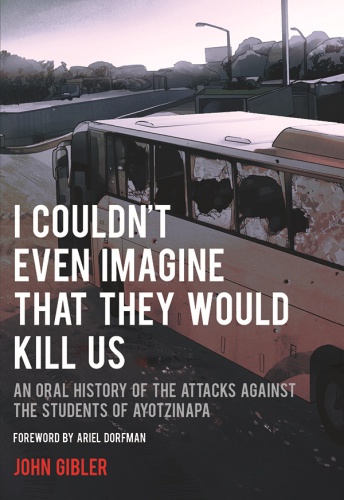
I Couldn't Even Imagine That They Would Kill Us
An Oral History of the Attacks Against the Students of Ayotzinapa
کتاب های مرتبط
- اطلاعات
- نقد و بررسی
- دیدگاه کاربران
نقد و بررسی

Starred review from September 11, 2017
Journalist Gibler (To Die in Mexico) delivers a meticulous and affecting recreation of the events of Sept. 26, 2014, in Iguala, Mexico, when police attacked five buses carrying students from the Ayotzinapa Teachers’ College and a youth soccer team. Six people died, 40 were wounded, and 43 students were loaded into police trucks and never seen again. This powerful oral history includes a chorus of voices: mainly the eyewitness accounts of the students but also the accounts of a teacher, soccer officials, reporters at the scene, parents of “the disappeared,” and others. It begins with the students discussing the teachers’ college—why they chose it (for many, because it’s free) and its values of social action—and proceeds with an account of the eight-hour attack and the aftermath in the school’s basketball court, where the families gathered between search expeditions. Gibler, in his afterward, highlights how the scale of the tragedy galvanized Mexico, a country where the drug war “enabled these forced disappearances,” and eventually led to an independent investigation by a panel of international experts, the findings of which contradict the government’s story. It’s a heartbreaking reconstruction of a horrific event, made all the more profound by the persistent demand from the parents of the disappeared, their classmates, and citizens across country for the safe return of the students.

October 1, 2017
An oral history of one horrific night when busloads of unarmed students were attacked by local Mexican police.Gibler (To Die in Mexico: Dispatches from Inside the Drug War, 2011, etc.) only presents one side, but he offers compelling testimony that there is no other side--that police attacked without provocation and the government did its best to cover up what it had perhaps authorized in the first place. The results seem beyond dispute: "that police killed 6, wounded more than 40, and disappeared 43 people." The fate of the disappeared remains open to question: were they sent to be incinerated by a drug gang in collusion with police, or, as their parents hope, are they still alive and held captive by the government? The Teachers College in Ayotzinapa was a progressive institution that was at odds with government repression. As one sophomore explains, "the way of life here, the context, the government harassment and persecution that is always present, I mean it never dissipates, and one has to start, little by little, getting used to the idea that this school isn't any old school." The underclassmen who dominate the early part of the account had no idea what they were getting into when they were enlisted to participate in an "action" commemorating an earlier police massacre of students in Mexico. They sensed something was wrong from the outset, when the bus drivers moved slowly and then stopped before armed police, who initially fired shots in the air but soon turned their fire on the students, who responded with rocks. When soldiers belatedly arrived, they threatened to turn the students over to the police who had been shooting them. Hospitals were indifferent: "They should have killed you," said one hospital director to those seeking help. This is the account of those who witnessed and survived the attacks as well as that of the parents who still search for the 43.Repetitive in detail but cumulatively very moving.
COPYRIGHT(2017) Kirkus Reviews, ALL RIGHTS RESERVED.

Starred review from October 15, 2017
When 43 students at a teacher's college went missing in a hail of gunfire from Mexican law enforcement officers in the fall of 2014, the story of the bewildering sequence of events made international headlines. As the grieving parents demanded answers and the return of their missing children, the state provided one implausible explanation after another, all proven false by neutral international investigators. To this day, neither the students nor their remains have been found. Their parents continue to agitate, seeking justice yet finding only terror and impunity. Gibler trekked out to Iguala, Guerrero, a few days after the attack to see what he could learn. From his interviews with student survivors and eyewitnesses, he has crafted a powerful oral history told in voices that pulse with terror, incredulity, and rage. In his own clear, powerful prose, Gibler places the tragic events in historical, political, and international context. On the final pages, he lists the names of the dead and the missing. This is an essential work of exacting, caring, and memorializing reportage.(Reprinted with permission of Booklist, copyright 2017, American Library Association.)

























دیدگاه کاربران